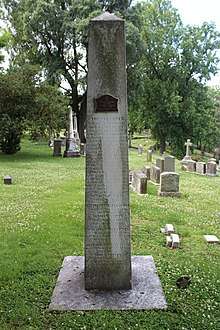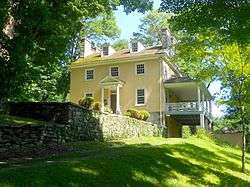Thomas Leiper
Thomas Leiper (15 December 1745 – 6 July 1825) was a Scottish American merchant and local politician who served in the American Revolutionary War. He was the first American to construct a permanent working railway by creating a short span on his property in Nether Providence Township, Delaware County, Pennsylvania.
Biography

Born in Strathaven, Lanark, Scotland, Leiper was educated at Glasgow and Edinburgh, and emigrated to Maryland in 1763. In 1765 Leiper moved to Philadelphia, Pennsylvania and opened a business storing and exporting tobacco. When the American Revolution began, the leading tobacco house in the community was interdicted and legally prevented from trading. Leiper seized the opportunity and expanded his business, soon becoming the principal tobacco agent in Philadelphia, then the capital of the United States.
Some years later Leiper built several large mills for the processing of tobacco and snuff in Delaware County, Pennsylvania. In 1780 he bought and operated quarries in the neighborhood of his mills, and provided stones for bridge and building construction. Granite from the Leiper quarry was cut for Philadelphia curbstones and door steps, and was used for buildings on the Swarthmore College campus, homes in Swarthmore, and the Leiper Presbyterian Church. Leiper built and rented out a Philadelphia home for the use of his friend Thomas Jefferson when Jefferson served as George Washington's Secretary of State. Leiper’s enterprises generated a large fortune, which enabled him to personally contribute to the improvement of Philadelphia and the Delaware County area, known as "Avondale," near his country residence in current day Nether Providence Township.
Leiper was a staunch Democrat, and served actively as chairman of Democratic town meetings. At one meeting, he was the first to nominate General Andrew Jackson for the presidency. He was a presidential elector, director of the banks of Pennsylvania and the United States, commissioner for the defense of the city in the War of 1812, and a member, and ultimately president, of the common council of the city of Philadelphia. Leiper died in Delaware County, Pennsylvania, on July 6, 1825 and was interred in Laurel Hill Cemetery in Philadelphia.[1]
Military service

Leiper was a founder of the Philadelphia City Troop, a city-based light cavalry, and served with them as lieutenant during the Revolution at the battles of Princeton, Trenton, Brandywine, and Germantown. As treasurer of the troop, he carried the last subsidies of the French to the Americans at Yorktown. He also acted with his corps in quelling several civil insurrections and riots, notably in the Whiskey Rebellion of 1794, and in an attack on the residence of James Wilson in Philadelphia, when he was one of the seven troopers that charged and routed the mob of rioters.
Railway and canal construction
In 1809 Leiper constructed the first permanent railway or tramway in America. A pair of iron rails laid on wooden ties ran from his quarries on Crum Creek to a landing on Ridley Creek in Delaware County. The road was three quarters of a mile in length. An ox, hitched to a cart filled with stone, walked between the rails slowly pulling the cart from the quarry to tidewater on Ridley Creek where the stream became navigable. There the cargo was loaded onto barges for the ten mile trip to Philadelphia. The short railway was actively used until 1828, when it was superseded by a cargo capable canal, also designed by Leiper before his death. In 1850, the Leiper Canal was in turn replaced by a spur of the B.&O. Railroad's Philadelphia-Baltimore line.
Correspondence
Correspondence between Thomas Leiper and Thomas Jefferson began in 1791, when Jefferson rented a house in Philadelphia from Leiper. More than one hundred letters were exchanged by the two men. During the first few years of correspondence, the letters concerned the rental house, building construction and tobacco. Leiper, as a Philadelphia tobacco merchant, bought his tobacco from Maryland and Virginia plantation owners including Jefferson and James Madison. Later letters discuss political issues, including the men’s mutual distrust of England. The correspondence continued after Jefferson became President of the United States and ended in 1825 with Leiper's death. A 30-page compilation of this correspondence was published by the Friends of Thomas Leiper House, in Wallingford, Pennsylvania.
Family
In 1778, Leiper married Elizabeth Gray, whose father was politically active in Pennsylvania. Leiper was 32 and Elizabeth 16 when they married. They had 13 children; 10 lived to adulthood. His son, George Gray Leiper, born in 1786, represented Delaware county in Congress from 1829 until 1831 and served as an associate judge of the Delaware County circuit court. His daughter Jane Duval Leiper married John Kintzing Kane, a U.S. district judge. The couple's children included naval officer, physician, and explorer Elisha Kent Kane and army General Thomas L. Kane.
References
- "Thomas Leiper". www.findagrave.com. Retrieved 21 June 2020.